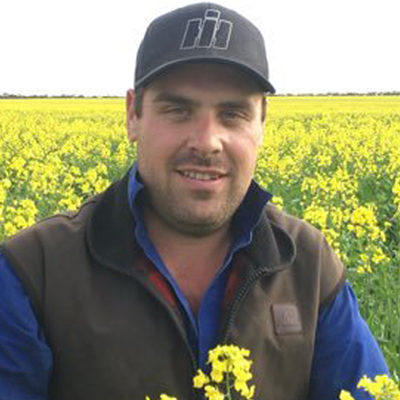
Brett South
National Winner | Community & People category
Esperance, WA
Brett South is a grain grower and a 2020 Growth Awards National Winner in the Community & People category. Read on to learn more about Brett.
What’s the one thing you have done in your career you are most proud of?
The establishment of the South East Prime Wheat Association Youth in Ag group about three years ago. After returning to the farm, I noticed there was a divide between older farmers and younger farmers, and between people in towns and those on farms. If you didn’t play sport and you were younger, you had nowhere to socialise. It meant that people left rural communities. I approached the SEPWA board and asked if they would support the development of a group for younger people who had a common interest in and passion for agriculture.
Three years down the track and we have had study tours to follow grain through from harvest to Vietnam, social get togethers, and two months ago, a farm tour to a large family operation and a corporate farm. We thought we might get 30 or 40 people on a bus and we ended up with 140 people. It’s not just young farming people who are coming but those who are agronomists or tractor mechanics or even interested town people.
How will you share what you learn with others in the industry?
There is an established network of people spanning out now from Esperance and we try to get together regularly and do things, so information could be easily shared through that network. When we started, we hand-picked a committee of people so information could be shared through those people to others. We plan to do more of our visiting days and social events, and information can be spread through the network that has been established. Even 10 years ago, if someone had information it was a big secret, but we are lucky we are in an area where everyone wants to share what they know with others. They see the big picture.
What do you see as your biggest opportunity in the next 12 months?
There is an opportunity to replicate what we have done with the SEPWA Youth in Ag group and branch it out in schools and TAFE to encourage people to stay in agriculture. It seems that people could be prepared to go into farming for a short time, maybe a gap year or two years, but then they leave the country and don’t come back. If we could establish that network which shows the good side of agriculture, then it could encourage people to come into the industry, and with a social framework in place, that might help. Not only would they try agriculture but if they are supported, they would stay.
What is the biggest barrier to achieving success in the next 12 months?
Having enough staff to run properties and be employed during busy times like harvest is a real concern. As farmers, we have shot ourselves in the foot to some extent as we have relied on backpackers to fill roles, especially at harvest. Now with COVID-19 and the inability to secure backpackers, we will be short of labour. We are also not good at telling people the benefits of being involved in farming and that will limit success in gaining staff. Many farm employees are given a house and a vehicle and live rent free, yet that does not seem to be well known. In Western Australia, the mining industry is a big drain on potential employees too, and perhaps as farmers we need to pay a bit more. We also need to keep the next generation from leaving the farm. It’s different now to what it was 30 years ago, when farmers rarely left the property, and everything was put back into the farm. Technology has allowed us to be more efficient and to have a better work-life balance. It is all very well to think that we will expand our farming operation but if there are no workers, then we just can’ t do it.
What is the biggest challenge Australian Ag has to overcome in the next 10 years?
It is important that the broader community understands agriculture and its role in the world. You could ask city people where their beef comes from and they will say the supermarket, not a cow. We need them to be able to know where their food and clothing comes from. If the general community has a better understanding of farming, then that helps with the issue of enough labour too as people will want to be involved. It’s never too early to educate people about farming and going into schools and teaching children about agriculture is where it should start. Not only would children know where their food and clothes come from, but it could also spark an interest in a career, whether that be an agronomist or a grain grower or a sheep farmer or a horticulturalist.